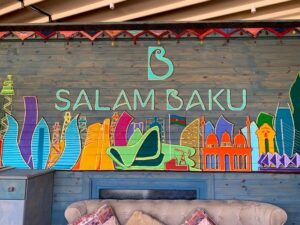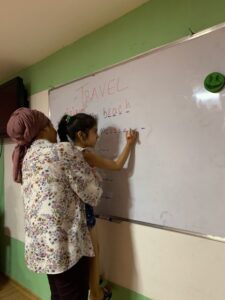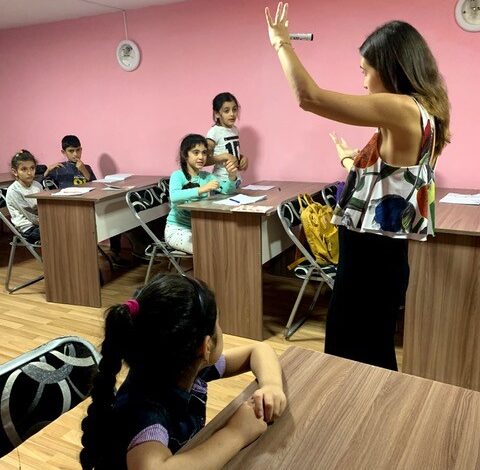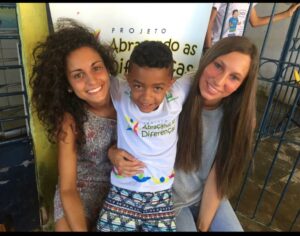LEADERSHIP AND VOLUNTEERING
In one of our last articles, we insisted that “the pandemic gave us hope and a chance to rebuild volunteering”. In this respect, it is very interesting to get to know more types of experiences and points of view. We could not help but discover and look at AIESEC, and we decided to interview Francesca Depino, Vice president of AIESEC in Bologna, who also volunteered in Azerbaijan.
What is AIESEC and what does it do?
“Established after World War II, AIESEC is a non-governmental, not-for-profit organization run by students, which spans 126 countries and territories. It believes that youth is the key to shaping a better future and therefore, it strives to develop youth leaders passionately driven by one cause: peace and fulfillment of humankind’s potential. Thus, it carries out three volunteering and traineeship projects: global talent, global teacher, global volunteer. As it has a permanent office within the ECOSOC, it builds the projects in order to achieve one or more of the Sustainable Development Goals of the UN 2030 Agenda.”
What do you mean by leadership?
“For AIESEC, the qualities that distinguish a good leader are world citizenship, solution orientation, self-awareness, ability to empower others. These make young people more aware of the reality in which they live, capable of taking charge of their future and, they also allow them to do something good for society. However, the most important thing to underline is that on the basis of all this there is a team working and the development of soft skills.”
What kind of experience did you have?
 “I was in charge of sending Italian volunteers abroad, including Azerbaijan. Since I did not know anything about that place, its history and culture, I thought I would go there too. So, in the summer of 2019, I took part in a six-week project in the suburbs of Baku. I was managed by the guys from AIESEC Baku, who had organised the “Dare to share” project, which was related to some goals of the UN 2030 Agenda: no poverty and quality education.
“I was in charge of sending Italian volunteers abroad, including Azerbaijan. Since I did not know anything about that place, its history and culture, I thought I would go there too. So, in the summer of 2019, I took part in a six-week project in the suburbs of Baku. I was managed by the guys from AIESEC Baku, who had organised the “Dare to share” project, which was related to some goals of the UN 2030 Agenda: no poverty and quality education.
Azerbaijan is a very developed country from the point of view of foreign relations, and in the last 30 years, it has experienced strong commercial growth. Given its proximity to the Caspian Sea, its economy is based on oil. However, despite the presence of this and many other resources, well-being affects only a few people. If you go inland to Armenia or Georgia, there is only poverty and misery. This is evident in the terrible health situation. I remember so clearly butchers hanging meat in the street and filthy markets. It is impossible not to notice the conditions of inequality across the country.
Considering all this, my project made a lot of sense. I taught English in an orphanage to children aged 5 to 16. Due to the country’s position and history, many guys could speak Russian, Turkish, Azerbaijani but knew nothing about English.”
Is there something that you remember? What did this experience teach you?
 “The scene that stuck with me the most was in the orphanage. We were having a lesson when we were interrupted to cancel it because shoes had arrived. I was shocked and asked myself “Why are they interrupting the lesson because of some shoes?”. Then we saw the children all going outdoors, as happy as if it were Christmas Day. They all got slightly bigger shoes because their feet would grow. These shoes were all black and all the same, but they held them in their arms as if they were the greatest gift of their lives. At that moment I thought “What are we doing to the world?”.
“The scene that stuck with me the most was in the orphanage. We were having a lesson when we were interrupted to cancel it because shoes had arrived. I was shocked and asked myself “Why are they interrupting the lesson because of some shoes?”. Then we saw the children all going outdoors, as happy as if it were Christmas Day. They all got slightly bigger shoes because their feet would grow. These shoes were all black and all the same, but they held them in their arms as if they were the greatest gift of their lives. At that moment I thought “What are we doing to the world?”.
This experience made me change my perspective on my life and altered my way of looking at a person in difficult circumstances. Our reality is just a little crumb in a big and complicated world.”
What do you think is the future of volunteering?
“During the pandemic, AIESEC never stopped, we just had to reorganize what we perceived as normality. I think the key is to never surrender and to adapt our work to this new situation. It must be done not just with words and theories, but it takes hope, flexibility, and adaptability.”


